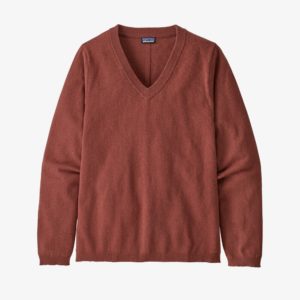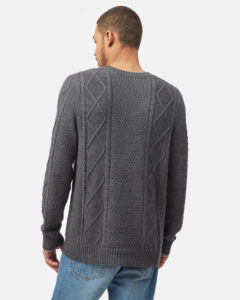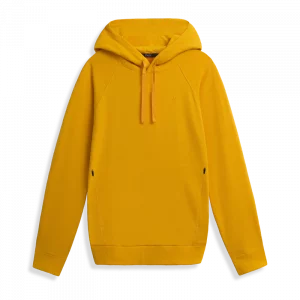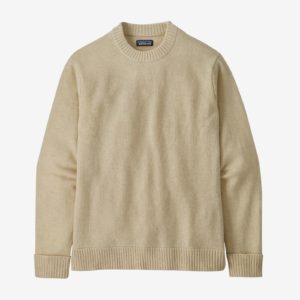Table of Contents
- Patagonia Men’s Recycled Cashmere Crewneck
- Organic Basics Recycled Wool Sweater
- tentree Highline Men’s Cable Knit Crew Sweater
- Ibex Men’s Tranquil Hoodie Sweatshirt
- Patagonia Recycled Wool Men’s Sweater
- Falconeri Ultralight Cashmere Crew Neck Sweater
- Novica Men’s Striped & Patterned Alpaca Sweater
- Le Slip: The Ludo
These sustainable men’s sweaters have one thing in common: lessness. Less materials, less waste, less greenhouse gas emissions, and less clothing turnover.
The importance of lessness in clothing (and in all industries) is growing every day. If brands and their weaving facilities emit less methane, refrigerants, nitrous oxides, and other harmful stuff into the atmosphere, then we will all have fewer problems to solve now and in the future.
The sweaters below are made using materials like recycled wool, sustainable cashmere, and organic cotton. Even better, you can buy these sweaters and keep them for a while. They can become a part of your journeys—they can create stories of their own that you remember when you slide them on year after year.
See also: Our top picks for cashmere sweaters
Samuel Beckett wrote a short story in 1969 called Lessness. The piece takes place in another world that resembles our world (and perhaps our future world if carbon continues to accumulate above us). One part of the story reads, “All sides endless earth sky as one no stir not a breath . . . Grey sky no cloud no stir earth ash grey sand.”
Check out the sweaters below – designed for men but suitable for folks of any gender!

Patagonia Men’s Recycled Cashmere Crewneck
Highlights: The cashmere used in these sweaters is “pre-consumer”, which in a nutshell means leftover pieces that would have otherwise ended up in a dump.
Recycled cashmere and responsible wool make up Patagonia’s cashmere crewneck sweater this winter. The cashmere is “pre-consumer”, which means the yarn fell as leftover pieces from other products and could have ended up in the dump. The large majority of Patagonia’s recycled sweater—about 95 percent—is made of pre-consumer recycled cashmere, while the remaining five percent is virgin wool that has been certified “Responsible Wool Standard,” which is meant to help sheep live in friendly and safe landscapes.
The sweater is made in Vietnam, so it will travel across the Pacific and increase GHGs, if you are in North America. The Vietnam factory’s information on Patagonia’s site does not talk about the factory’s source of energy to produce the sweater—i.e., whether the factory buys power that has been generated by coal, fossil gas, solar panels, or some other energy resource.
Four simple colors, reasonably priced, and recycled, meaning you should consider this piece if you need a warm mid-layer as soon as possible.
Patagonia is also a B Corp and founder of 1% for the Planet, making it one of the more sustainable, industry-leading clothing and gear brands around.

Organic Basics Recycled Wool Sweater
Highlights: Made in Portugal entirely out of recycled merino wool in a way that cuts both water usage and carbon emissions.
This sweater is made in Portugal and completely out of recycled merino wool. Using recycled wool saved about 139 liters of water, which equals about two eight-minute-long showers, and about 26 kg of carbon emissions, which equals about three gallons of gasoline.
Organic Basics is in Copenhagen, Denmark, so your recycled sweater would have to be flown across a large body of water to make it to you in North America. But the company sends products using CO2-nuetral shipping with DHL, which has a “GOGREEN” carbon-neutral shipping option. The shipping program allows businesses to send their products to customers and then purchase carbon-offset credits that help build things like a waste facility in Chile that captures methane from a landfill.
Even so, less shipping would be preferable to more shipping, so it is important for the recycled wool sweater to be ready to last for as long as a sweater made of virgin wool. A few reviews said the sweater is “great quality” and the “exceptional” construction. However, one review said the sweater is itchy: “If you’re sensitive to the feel of material on your skin it’s not a good choice.”
The company says it’s number one rule about making clothes is, “Design everything to last.”

tentree Highline Men’s Cable Knit Crew Sweater
Highlights: A cozy cable knit with waffle pattern perfect for chillier days. Made with 100% organic cotton, with ribbed hems, cuffs, and neck.
The tentree Men’s Highline Cable-Knit Crew Sweater is made with 100% organic cotton in a cable knit with waffle knit pattern outside of the cables. There’s a ribbed neck band, hem, and cuffs, all of which help to keep your warmth in on chillier days. The 7-gauge knit is refined, with a relaxed drape, making this a deceptively cozy sweater perfect for home and work.
The sweater is available in sizes Small through XXL, and in four colors including a warm cherry mahogany orangey brown.
tentree is a B Corp and and plants ten trees (in a sustainable way) with every purchase.

Ibex Men’s Tranquil Hoodie Sweatshirt
Highlights: Made mostly of merino and organic cotton, this stylish hoodie is smartly designed with invisible zippered pockets, Raglan sleeves, and rib knit hems and cuffs to help you stay cozy without restricting mobility.
A great midlayer, the Ibex Men’s Tranquil Hoodie Sweatshirt is made with a blend of organic cotton (70%) and merino (26%) and a dash of elastane (4%) for stretch. The terry fabric is 19.5 microns, 230 gm2, and super soft. The design features Raglan sleeves to allow for mobility and rib knit hem and cuffs to keep it cozy. There are invisible zip pockets (89% merino wool and 11% nylon) for warmth and safety without compromising style, and an adjustable hood with drawstring to keep the chill wind out when needed.
The hoodie is available in sizes Small through XXL and in four colors, including a fun bright ocean blue and a sunshine yellow. Machine wash this hoodie cold and line dry or machine dry on a low setting.
The fabric is made in Australia and the hoodie sewn in Vietnam under fair working conditions. Ibex ships all its products in biodegradable bioplastic protective bags. The company is very transparent about its supply chains and sustainability practices, including sourcing Woolmark and RWS wool and using non-toxic dyes and processes to achieve GOTS and OEKO-Tex certifications.
Ibex also invests in solar projects to achieve at least 35% renewable energy inputs for manufacturing and has a 5-stage water treatment and recycling system in place. It only works with WRAP certified factories, meaning excellent assurance of no forced or child labor and better working conditions for the folks making these clothes.

Patagonia Recycled Wool Men’s Sweater
Highlights: A cozy recycled wool sweater with recycled nylon in a 7-gauge Jersey knit for warmth. This well-made, durable crewneck sweater has ribbed hems and double-layer cuffs for extra warmth.
Patagonia’s recycled crewneck wool sweater comes in several neutral colors and a more festive Pine Knit pattern in Northern Green (a great choice for a sustainable Christmas sweater!). This crewneck sweater intended for men comprises 70% recycled wool, 26% recycled nylon, and 4% other fiber (likely elastane, for a bit of stretch). While it looks fairly lightweight and refined, don’t let that fool you; this sweater is a 7-gauge Jersey knit in a fisherman’s stitch, making it super cozy and durable.
Patagonia’s sweater is also made with fully fashioned armholes and hand-linked finishes at the cuffs and hem, meaning it’s more likely to stand the test of time. The cuffs are rib-knit and double-layered to help retain warmth and keep you cozy.
While marketed as a men’s sweater, this is a great choice for folks of any gender. Get it in sizes small through XXL and in five colors and the festive pattern.
Patagonia makes these sweaters in Vietnam under fair working conditions. The company is a founder of 1% for the Planet and is a certified B Corp.
Before buying this sustainable sweater new, check Patagonia’s worn wear outlet. If you’re lucky, there will be a similar sweater at a hefty discount!

Falconeri Ultralight Cashmere Crew Neck Sweater
Highlights: The cashmere that makes up these crew neck sweaters is part of the Sustainable Fiber Alliance, which aims to ensure transparency and ethics in the cashmere processing chain.
Falconeri’s ultralight cashmere wool sweater is made completely out cashmere in Italy and doesn’t totally break your bank for a warm layer. The cashmere comes from goats in Mongolia, so unfortunately some GHGs are associated with transporting the material to Italy. But Falconeri chooses cashmere that is part of the Sustainable Fiber Alliance, which watches out for problems in the cashmere processing chain.
Cashmere from goats is eight times warmer than wool from sheep, meaning you need less material to provide the same amount of heat to your body. Less material equals less production and processing, which equals less carbon emissions. Cashmere is also biodegradable, and Falconeri says its sweaters are durable and meant to last a long time. Plus, Falconeri’s sweaters are simple, meaning it would be hard for them to go totally out-of-style, so they should be able to hang in your closet for a long while.
Handwashing in cold water is allowed, meaning you also save carbon emissions by not using warm or hot water in your washing machine at home (which might have been warmed by fossil gas). Using cold water to gently hand wash the sweater is like washing it in a cold mountain river on a stroll through the woods: almost Utopian.

Novica Men’s Striped & Patterned Alpaca Sweater
Highlights: An option made from pure alpaca wool sourced from a woman-owned workshop that follows all fair-trade guidelines.
Made of pure Alpaca wool, Ana Fernadez’s pullover sweater does not leave behind microplastics that are found in clothing made with polyester and acrylic. About 35 percent of global microplastic pollution comes from the clothing and textiles industry. Don’t blame Ana’s sweaters, though. They are made with Alpca from Peru and in her workshop that is woman-owned and employs twenty people.
Ana’s sweaters can be found on NOVICA, which sells artisans’ products from around the globe and says it follows all fair-trade guidelines. For some reason, the Alpaca sweater is not listed on NOVICA’s “Eco-Friendly Clothing” page. It’s hard to tell how NOVICA qualifies a product as Eco-Friendly. Most of NOVICA’s eco-friendly sweaters are cotton (one is even recycled cotton), so maybe wool scores lower on their sustainability scale (although one alpaca wool piece—a poncho—made the eco-friendly list).
So take a look through these sustainably-made sweaters and choose the one that will stay with you until the end of times.

Le Slip: The Ludo
Highlights: 100% wool sweater free from microplastics made using local material from France’s Castres region.
Le Slip’s merino wool Ludo sweater is made in a commune in the South of France using local material from the country’s Castres region. It is 100-percent wool, which means you don’t need to worry about microplastics going down your drain when you wash it. Plus, The Ludo can be handwashed, so you do not need to take it to a dry cleaner or use a natural-gas-powered clothes dryer.
The Ludo is unisex, meaning you can give it away to any of your friends or family, if you’ve decided you need something different after a decade of wear. Same idea if you turn the sweater in at a thrift store: More potential consumers could swoop up the unisex sweater and give it a new life.
Wool is not considered vegan, so that’s a downer. Also, the sweaters live in France, meaning they need to be shipped overseas (if you are located on this side of the waters). But if you are traveling in Europe and can snag one of these while you are in France, then your sustainability score just bumped up.
Le slip uses local products—from yarn to packaging. Doing so creates jobs, maintains production knowledge, and slowly changes the fashion industry away from fast and messy to slow and less harmful. The company also uses recycled materials (cotton, wool, and recycled polyester) and other bio-friendly materials (lyocell, recycled wool, and organic cotton). Hard to find holes in these sweaters. Check them out.